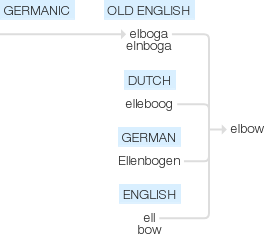Elbow
Old English elboga, elnboga, of Germanic origin; related to Dutch elleboog and German Ellenbogen (see also ell1, bow1).
wiktionary
From Middle English elbowe, from Old English elboga, elnboga(“elbow”), from Proto-Germanic *alinabugô(“elbow”), equivalent to ell + bow. Cognate with Scots elbuck(“elbow”), Saterland Frisian Älbooge(“elbow”), Dutch elleboog(“elbow”), Low German Ellebage(“elbow”), German Ellbogen, Ellenbogen(“elbow”), Danish albue(“elbow”), Icelandic olbogi, olnbogi(“elbow”).
etymonline
elbow (n.)
"bend of the arm," c. 1200, elbowe, from a contraction of Old English elnboga "elbow," from Proto-Germanic *elino-bugon, literally "bend of the forearm" (source also of Middle Dutch ellenboghe, Dutch elleboog, Old High German elinbogo, German Ellenboge, Old Norse ölnbogi).
First element is from PIE *elina "arm," from root *el- "elbow, forearm." Second element is from Proto-Germanic *bugon-, from PIE root *bheug- "to bend." To be out at elbows (1620s) was literally to have holes in one's coat. Phrase elbow grease "hard rubbing" is attested from 1670s, from jocular sense of "the best substance for polishing furniture." Elbow-room "room to extend one's elbows," hence, "ample room for activity," is attested from 1530s.
elbow (v.)
"thrust with the elbow," c. 1600, from elbow (n.). Figurative sense is from 1863. Related: Elbowed; elbowing.
